Look at the picture of Chinese modernization, rich peasants with tea fragrance
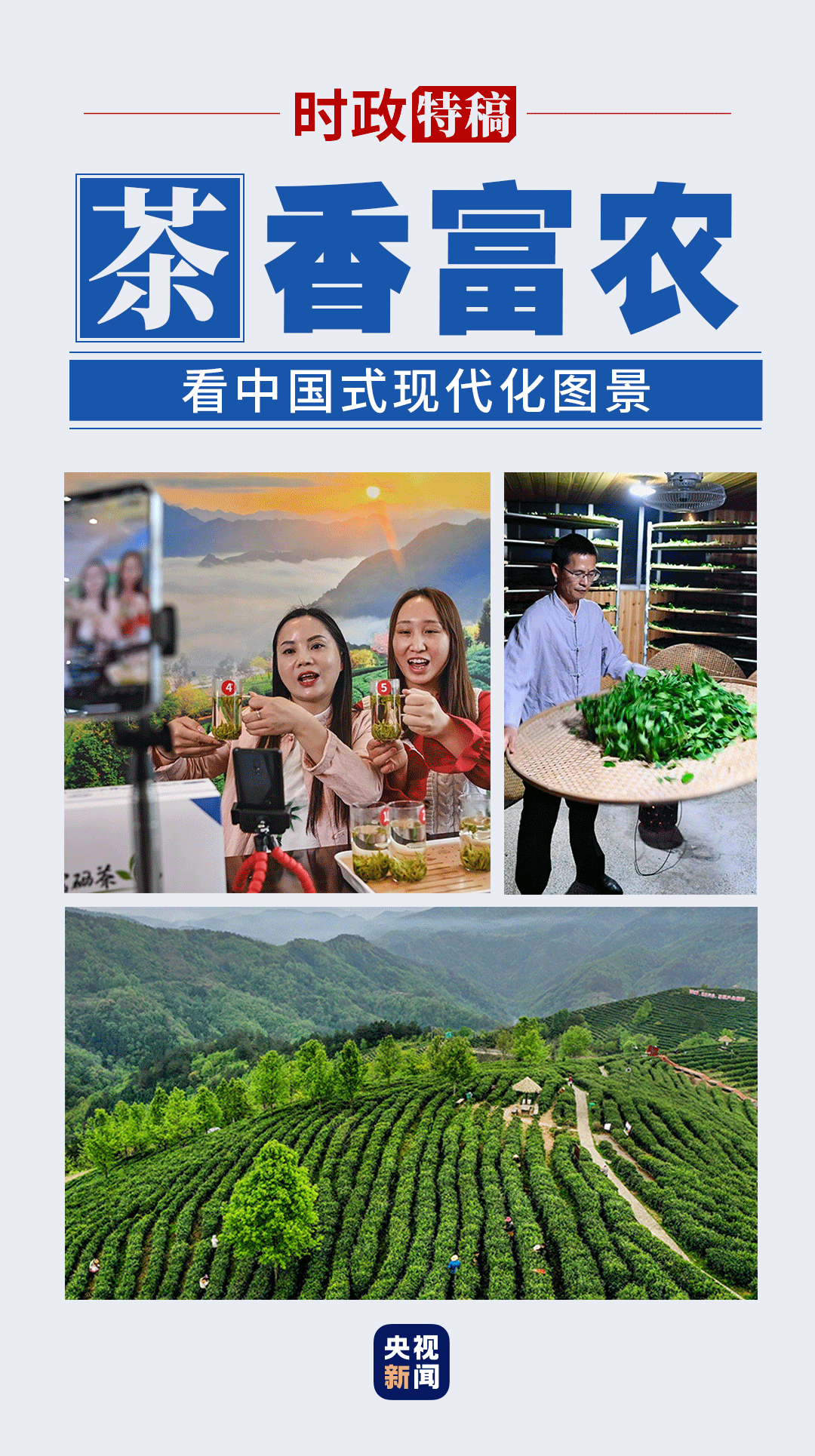
It is said that good mountains and water produce good tea, which is the case in Wuyishan, Fujian.
Walking into Wuyishan Swallow Nest Ecological Tea Garden, it is full of green and fragrant tea. There are all kinds of birds and insects in a row of tea trees, just like a miniature ecological circle.
"We interplant soybeans in summer and rape in winter. After the rapeseed is finished, it is a good nitrogen fertilizer to bury the rapeseed. " "Compared with before, the taste of tea is sweeter and more fragrant, the foam resistance of tea is improved, and the quality rate of tea is increased by more than 20%."
The demonstration plot of Yanzichen Tea Garden adopts the rotation mode of "organic fertilizer+green manure". After the application of organic fertilizer in winter, rape is planted, and it is mowed and buried in the soil at the end of March. After the end of spring tea, soybean is interplanted in the border. While protecting the ecology, let the tea industry increase production and increase efficiency.

△ On March 22nd, 2021, General Secretary of the Supreme Leader visited Yanzike Ecological Tea Garden in Xingcun Town, Wuyishan City, Nanping, Fujian Province.
On March 22, 2021, General Secretary of the Supreme Leader, who was investigating in Fujian, came here to see the growth of spring tea and understand the development of local tea industry. The Supreme Leader stressed that it is necessary to do a good job in tea culture, tea industry and tea science and technology, adhere to the direction of green development, strengthen brand awareness, optimize the marketing and circulation environment, and lay a solid industrial foundation for rural revitalization.
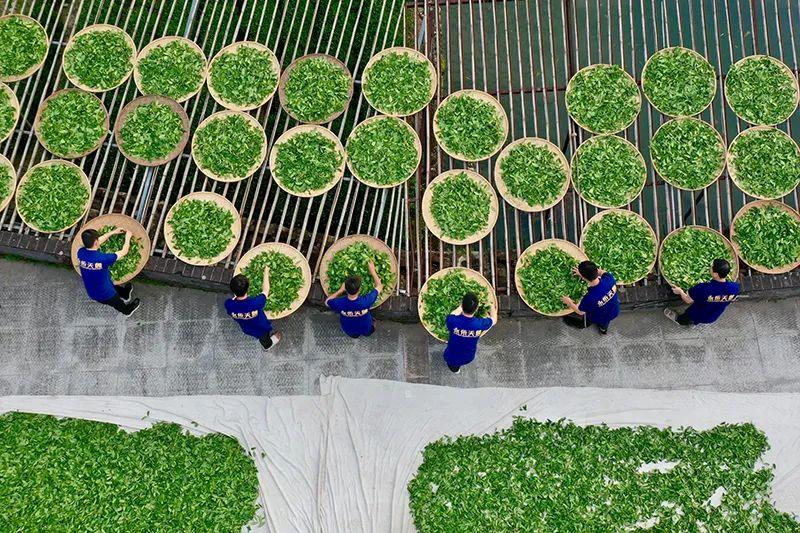
△ Workers of Xianfan Tea Factory in Xingcun Town, Wuyishan are making Wuyi Rock Tea.
Rural revitalization is the only way to achieve common prosperity. Looking at the whole country, tea trees and tea gardens have broadened the channels for farmers to increase their income and become rich, paving a promising road to common prosperity.

Pingli County, Shaanxi Province, is located at the junction of Shaanxi, Hubei and Chongqing provinces. This is a tea town with a long history, which was one of the eight major tea areas in China as early as the Tang Dynasty.
On April 21, 2020, General Secretary of the Supreme Leader came to a tea garden in Jiangjiaping Village, the old county town of Pingli County. At the beginning of the spring rain, the general secretary walked up the steps along the muddy path and came to the tea farmers who were working in the tea garden.

△ On April 21st, 2020, General Secretary of the Supreme Leader visited the tea garden in Laoxian Town, Pingli County, Ankang City, Shaanxi Province.
On the high mountain, a ridge of tea trees is growing vigorously.
"The tea-picking season lasts for three months every year, and you can get more than 200 pieces in a fast day, and there are also hundreds of pieces. As you said, Lucid waters and lush mountains are invaluable assets! " Tea farmers showed the General Secretary the newly picked "Jin Yezi" in the bamboo basket.
"People don’t live up to the castle peak, and the castle peak will live up to people." The general secretary said happily, "I hope that the villagers will get rich because of tea and prosper because of tea, and get rid of poverty and run a well-off society!"
When leaving, General Secretary of the Supreme Leader turned around and said, "Your place is already changing, and it will become better in the future."
The tea garden visited by the General Secretary was founded in 1974 and is located on the hillside of the middle reaches of the Yellow River at an altitude of more than 600 meters. Here, the ecological environment is excellent, the daytime illumination is sufficient, the tea produced is pollution-free, and it has the rich tea fragrance of camellia.
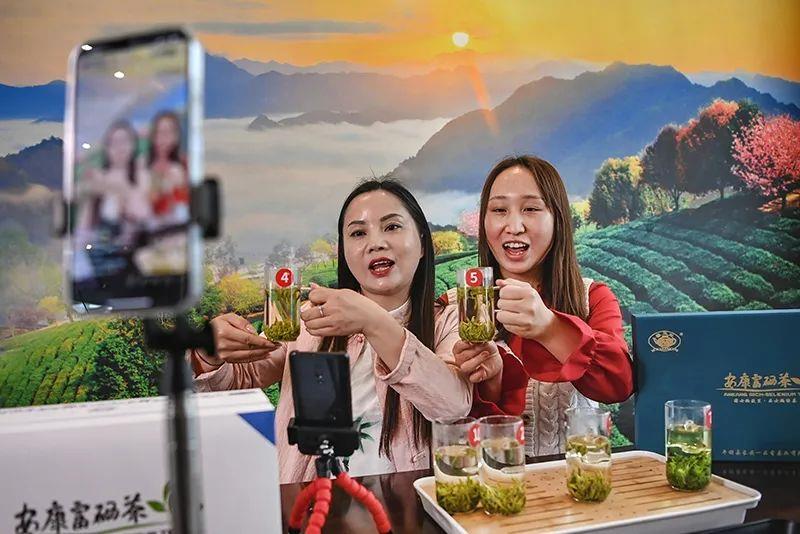
△ Tea farmers in Pingli County introduce new tea knowledge in the live broadcast room.
"Live broadcast with goods, tea is popular. Before Qingming, the handmade fried tea at home sold for 1,100 yuan per catty. " Shen Xiaoyan is a young entrepreneur who has returned to her hometown. Her family has a 10-mu tea garden. Her parents pick and make tea, and she sells it online. There are 2,750 mu of tea gardens in Jiangjiaping Village, Pingli County, and 186 households in the village have become rich through tea.
Not only that, the tea in Jiangjiaping Village has also driven the surrounding rural workers. Chen Guiying, a villager who married from Jiangjiaping Village to Ma ‘anshan Village, takes the villagers to work in Jiangjiaping Tea Garden every spring, and can earn more than 100 yuan by picking tea every day before and after Qingming Festival.
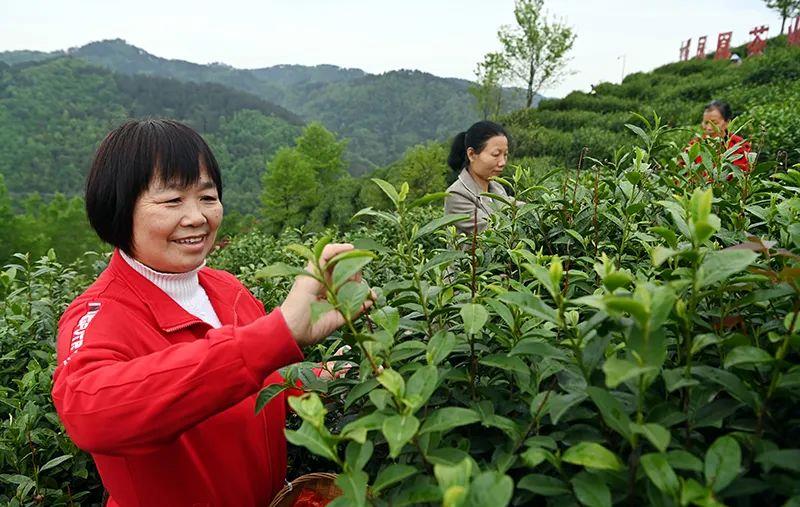
△ Villagers in Jiangjiaping Village, the old county town of Pingli County are picking tea in the tea garden.
In 2022, the tea garden area in Pingli County was 250,000 mu, and the total tea industry was 17,000 tons, with an output value of 1.856 billion yuan. More than 100,000 people in the county are engaged in tea-related industries, which drives the per capita income of rural residents to increase by 3,584 yuan, accounting for 30.45% of the disposable income of farmers. Tea industry has become the first industry for rural revitalization in Pingli County, basically achieving the goal of "one acre of garden per capita and 10,000 yuan per household".
In response to the words of the general secretary, the lives of the villagers are getting better.

A leaf not only enriches the people, but also brings the hope of getting rich to a small mountain village far away from Qian Shan.
Tunshang Village, Pu ‘an County, Guizhou Province is located in the hinterland of Wumeng Mountain, with the highest elevation of over 1,800 meters and only half an acre of cultivated land per capita. The village has tried to develop industry on sloping land, but due to the limitation of natural environment and traffic conditions, it is difficult to produce high yield and sell crops. Villagers have gone out to work.
More than four years ago, Huangdu Village, Anji, Zhejiang Province donated the "Baiye No.1" poverty alleviation tea seedling in Tunshang Village, bringing hope of getting rich to the small mountain village. In 2022, tea trees officially ushered in the first harvest season.
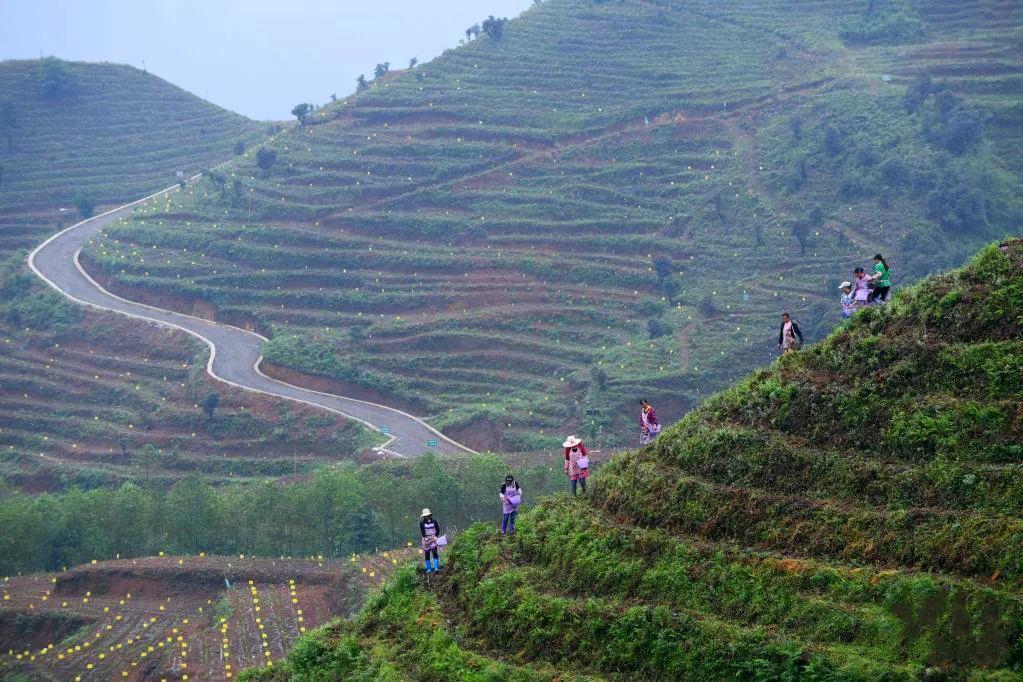
△ Villagers fertilize tea seedlings in the "Baiye No.1" Thanksgiving Tea Garden in Tunshang Village, Pu ‘an County, Guizhou Province.
"The monthly income from working is two or three thousand yuan, which is much more than before!" Four years ago, Tan Huaai was a poverty-stricken household who set up a file in Tunshang Village, Sweet Potato Town, Pu ‘an County, Guizhou Province. The husband is in poor health and needs to be taken care of, and the two children are still at school. When the village proposed to develop a tea garden, Tan Huaai hesitated for a long time before transferring his 8 mu slope. "At that time, I was worried that the tea garden would not develop and eating would be a problem."
"The tea garden has driven us and 2020 people from 691 households in surrounding villages to increase their income. Since 2020, the income from working has exceeded 11 million yuan." Looking at the tea tree in Manshan, Konglingjin, secretary of the Party branch of Tunshang Village, introduced it. Taking the opportunity of receiving 2,000 mu of white tea seedlings, Puan County has developed the tea industry according to local conditions. Now, the total area of tea gardens has expanded to 183,000 mu, including 13,000 mu of "Baiye No.1", and the comprehensive annual output value of tea is nearly 1.7 billion yuan.
In Anji, Zhejiang Province, the planting area of white tea has exceeded 200,000 mu, with a total output value of more than 3.1 billion yuan, which has increased the per capita income of farmers in Anji County by more than 8,600 yuan, accounting for about 24% of the per capita disposable income of farmers. In 2021, the regional public brand value of Anji White Tea reached 4.517 billion yuan, and it was selected as one of the top ten in China for 12 consecutive years.

△ On April 9, 2003, the supreme leader comrade, then secretary of Zhejiang Provincial Party Committee, gave a high evaluation of Anji White Tea "a leaf is rich for the people" when investigating in Huangdu Village. A stone tablet engraved with the words "A leaf enriches the people" stands beside the 10,000-acre tea garden in Huangdu Village (photo taken on February 21).
In April, 2018, 20 party member from Huangdu Village wrote a letter to the Supreme Leader General Secretary, reporting the situation of growing white tea in the village and proposing to donate 15 million tea seedlings to help people in poverty-stricken areas get rid of poverty. The General Secretary of the Supreme Leader made important instructions to emphasize that "people who dig wells will not forget when they eat water, and the party’s grace will not be forgotten when they get rich", which is very well said. Strengthening the consciousness of thinking about the source of drinking water, not forgetting the party’s kindness, and carrying forward the spirit of sharing worries for the party and helping the rich first are of great significance for winning the battle against poverty.

△ Tourists take pictures in the coffee shop beside the 10,000-acre tea garden in Huangdu Village, Anji County, Zhejiang Province (photo taken on February 21).
Since then, Anji County has successively donated "Baiye No.1" tea seedlings to five counties in Pu ‘an, Yanhe, Leishan, Qingchuan, Sichuan and Guzhang, Hunan, and sent agricultural experts to stay in the station for a long time.
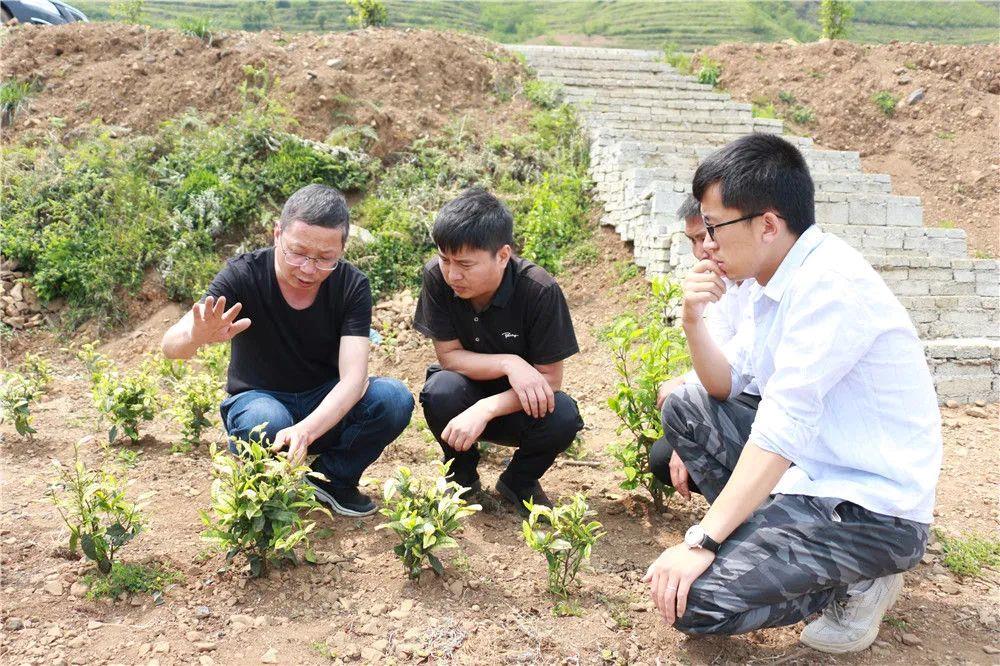
△ Qian Yirong (first from left), an agricultural technology expert in Anji County, Zhejiang Province, guides the staff in the "Thanksgiving Tea Garden" in Tunshang Village, Sweet Potato Town, Pu ‘an County, Guizhou Province.
The donated white tea has driven more than 6,600 local poor people out of poverty and increased their income, and all the 37 poverty-stricken villages have been lifted out of poverty. The white tea industry has continued to grow and become the leading industry for rural revitalization.

Tea not only allows Anji, Zhejiang Province to join hands closely with the people in three provinces and five counties in the central and western regions, but also becomes a pillar industry for rural revitalization in many places.
"The general secretary said that Liubao Tea is very famous! The general secretary also asked me if Liubao tea could be brewed and boiled. Is it better to keep it as long as possible? He also asked us if Shanping Village had its own tea brand, and told us to make our own brand and make the tea industry bigger and stronger. "
On October 26th, 2022, Zhu Xuelan, the representative of the 20th National Congress and secretary of the Party branch of Shanping Village, Liubao Town, Cangwu County, Wuzhou City, Guangxi Province, shared with you the face-to-face scene of his delegation in Guangxi.
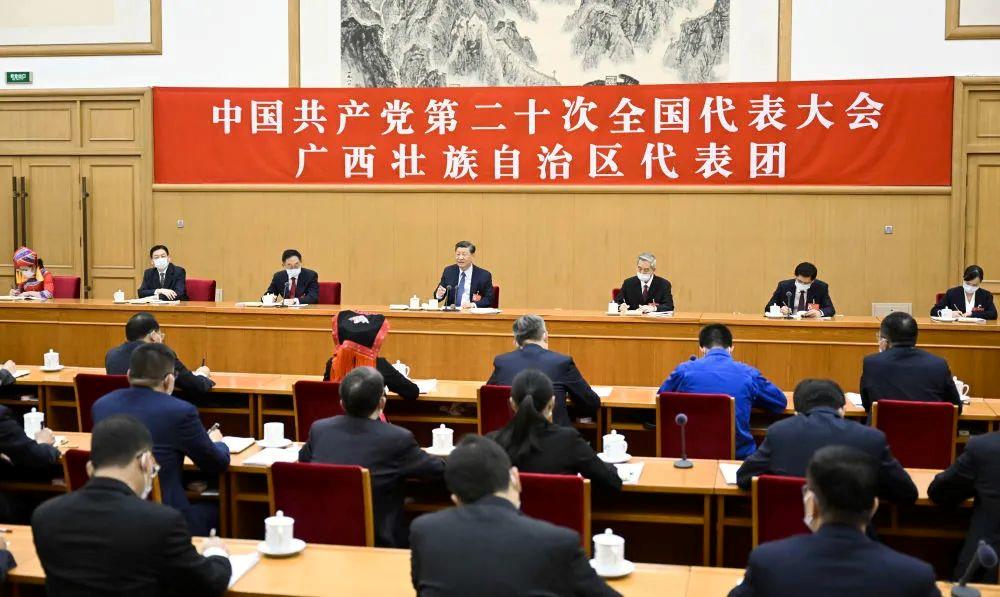
△ On October 17, 2022, General Secretary of the Supreme Leader participated in the discussion of the party’s top 20 Guangxi delegations.
Liubao tea, which is famous for its "red, strong, old and mellow" and unique betel nut fragrance, is named after its place of origin, and the grand occasion of the "tea boat ancient road" has been talked about so far. Liubao tea, which has been passed down for thousands of years, has a set of high-standard production technology. However, the production process of each household in Shanping Village is not uniform, and the quality of tea is uneven.
Born in a "tea-making family", Zhu Xuelan was immersed in tea fragrance since she was a child. Looking at the tea trees in the village, she decided to disclose her tea-making skills at home.
"How can ancestral craftsmanship be passed on to outsiders?" When the idea was first put forward, it was opposed by her family, but Zhu Xuelan had her own insistence. "If the industry wants to develop, it is certainly not as good as the development of the group. Only by playing your own brand can you really do a good job in the industry."
The small bungalow where she cooked tea became a "classroom", and Zhu Xuelan set up a "tea garden lecture hall". People in Shanping Village and neighboring villages and towns all came here for advice. Nearly a thousand tea industry practitioners have mastered the traditional tea-making technology, and the tea fragrance of Liubao tea in the village has become more mellow.
Nowadays, the local area explores the mode of "tea+health+tourism" and actively builds Liubao tea industry (core) demonstration area and "national characteristic town". The annual per capita income of villagers exceeds 20,000 yuan, and the annual output value of Liubao tea core producing area is about 1 billion yuan.
Zhu Xuelan said happily: "More than ten years ago, my daughter-in-law came to my house and walked for more than four hours on the mountain road. She wanted to go back to her family without entering the door. Today’s Shanping Village, not only local girls don’t want to leave, but also foreign girls want to marry, and many foreign village boys also want to be door-to-door sons-in-law! "
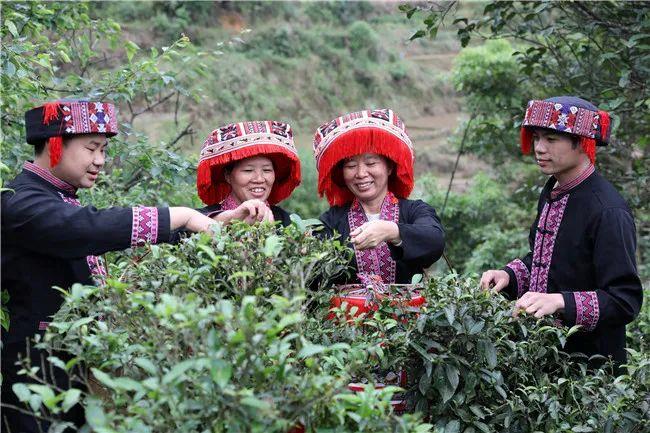
△ Zhu Xuelan (second from right) leads the villagers to pick tea.
A leaf, a total of rich.
Getting rich "Jin Yezi" has become an industry that drives one villager to get rid of poverty and become rich, and continues to exert its strength and support hope in rural revitalization.